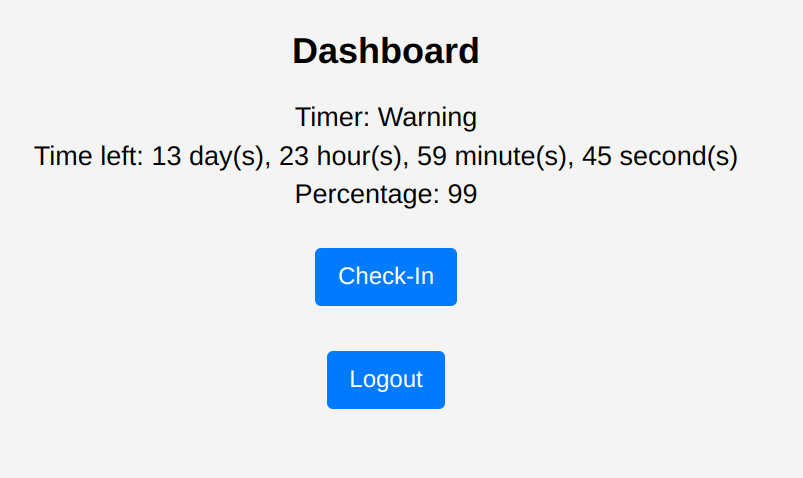2 releases
| 0.6.1 | Mar 7, 2025 |
|---|---|
| 0.6.0 | Jan 19, 2025 |
| 0.5.1 |
|
| 0.5.0 |
|
| 0.4.0 |
|
#250 in Command-line interface
139 downloads per month
19KB
269 lines
Dead Man's Switch
This is a simple implementation of a Dead Man's Switch.
Use at your own risk. Check the f****(as in friendly) code.

Dead man's switches are designed to require positive action or they will automatically deploy. They are ideal for situations where you are worried about unforeseen death, kidnapping, or memory loss. If you don’t engage the trigger for a certain amount of time, the switch automatically sends the desired message.
Features
- Simple: Easy to use and setup.
- Reliable: Implemented in Rust.
- Minimal: Very few dependencies and needs minimal resources.
- Warning: Sends a warning email before the final email.
- Attachments (Optional): Send attachments with the final email.
How it Works
If you want a very simple explanation and the motivation behind the project, check my blog post here.
Upon starting the program it will create a config.toml
file in an OS-agnostic config file location:
- Linux:
$XDG_CONFIG_HOME, i.e.$HOME/.config,/home/alice/.config - macOS:
$HOME/Library/Application Support, i.e./Users/Alice/Library/Application Support - Windows:
{FOLDERID_RoamingAppData}, i.e.C:\Users\Alice\AppData\Roaming
Edit the config.toml file to your liking.
Some default values are provided for inspiration.
Dead Man's Switch comprises of two timers:
- Warning Timer: This timer is set to the
timer_warning(seconds) value in theconfig.tomlfile. If the user do not check-in before timer reaches 0, it will send a warning email to the users' own specified email address, thefromin theconfig.toml. - Dead Man's Timer: After the warning timer expires, the timer will change
to a Dead Man's timer, and the timer will be set to the
timer_dead_man(seconds). If the user do not check-in before timer reaches 0, it will send the final email to the specified email address in theconfig.toml, i.e. thetoin theconfig.toml.
If you want to send attachments with the Dead Man's email,
you can specify the attachments option config in the config.toml
and provide the absolute path to the file you want to attach.
To check-in, you just need to press the c key as in check-in.
Installation
There are several ways to install Dead Man's Switch:
-
Crates.io:
cargo install --locked dead-man-switch-tui. -
GitHub:
cargo install --git --locked https://github.com/storopoli/dead-man-switch -p dead-man-switch-tui. -
From source: Clone the repository and run
cargo install --locked --path .. -
Using Nix:
nix run github:storopoli/dead-man-switch. -
Using Nix Flakes: add this to your
flake.nix:{ # ... inputs.dead-man-switch = { url = "github:storopoli/dead-man-switch"; inputs = { nixpkgs.follows = "nixpkgs"; flake-parts.follows = "flake-parts"; }; }; outputs = inputs @ { self, ... }: { imports = [ { nixpkgs.overlays = [ # ... inputs.dead-man-switch.overlays.default ]; } ]; }; }Then
dead-man-switchwill be available aspkgs.dead-man-switch;
Using as a Library
Dead Man's Switch can be used as a library. This includes all the functions necessary to configure and send emails; along with the timers.
To do so you can add the following to your Cargo.toml:
[dependencies]
dead-man-switch = "0.6.1"
Web Interface
The Dead Man's Switch is also available as a web interface.

To use the web interface, please follow the instructions below:
-
Change the configuration template file with your own values:
cp config.example.toml config.toml -
Copy the Docker Compose example file:
cp docker-compose.example.yml docker-compose.yml -
Run the Docker Compose:
docker-compose up --detach -
Make sure to reverse proxy the web interface with proper security measures such as HTTPS.
StartOS package
![]()
The Web Interface can be easy deployed to any device that runs startos.
Check the instructions at storopoli/dead-man-switch-startos
License
The source code is licensed under an AGPL v3 License
Dependencies
~20–49MB
~850K SLoC
